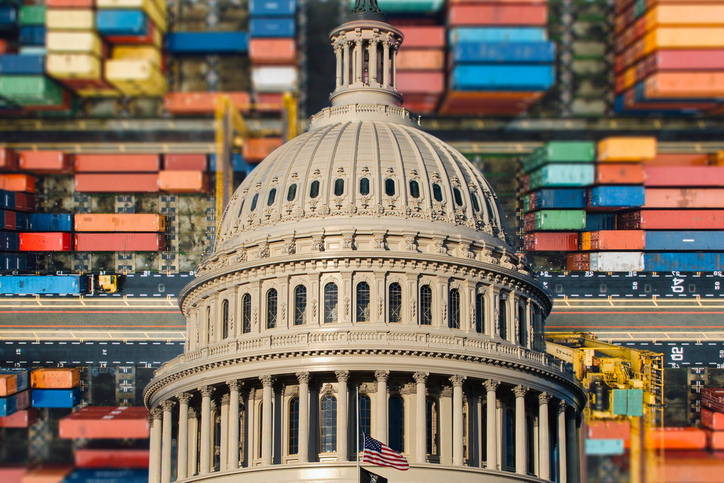The investment industry is well-known to make things more complicated than necessary. However, this time, things really are complicated. Given the complexity, and the potential ramifications, of the Administration’s recently announced tariffs, I felt it best to put down our thoughts in a bullet point format.
Hopefully, this guide will make our opinions on a very thorny topic easier to understand.
- We continue to believe the Administration’s tariffs are a negotiating tactic, and the President doesn’t intend for them to be permanent. As a result, it appears as though Washington is going to determine success on a country-by-country basis.
- Fortunately for the U.S. consumer, American businesses have been significantly increasing their inventories. If products are already on the shelves or in the warehouse, they won’t be subject to these tariffs. As a result, the consumer will have a little bit of a reprieve before any potential price increases.
- While it remains to be seen how much these tariffs will impact consumer prices, the markets aren’t treating them as inflationary. Instead, they appear to be viewing them as impediments to economic growth and consumption, which would keep inflation under check.
- With the 1st quarter 2025 earnings season just days away, it is highly possible companies decline to give “forward guidance” due to the economic uncertainty of the tariffs. As a result, investors could be “flying blind” for a quarter or two.
- Tariffs are a tax. History suggests you tend to get less of something the more you tax it. If this is true, we should expect consumer spending to slow if the taxes result in higher prices.
- International trade has always stimulated the flow of ideas, goods & services and economic activity. Tariffs are an impediment to trade, and therefore to economic growth, in the short-term. As a result, we should expect the economy to grow slower than it would have, again in the near-term, absent these tariffs.
- Longer-term, shrinking the massive U.S. trade deficit should have a positive impact on longer-term interest rates— and in turn, lower the cost of capital in the American economy. Should the Administration’s tariff policies eventually lead to a smaller trade deficit, they could have a positive impact. The only question is how much pain will the economy have to endure until then.
- Fortunately, the official economic data has largely been decent prior to yesterday’s announcement. Hopefully, this will provide enough of a buffer to help us avoid a recession until the Administration can work out deals with our primary trading partners.
- The decision to manufacture in a particular area or country is not one companies make lightly or quickly. As a result, any subsequent increase in U.S. production due to these tariffs will not be immediate.
- Given the sharp decline in the U.S. dollar since the President’s announcement, the initial reaction from foreign investors has not been positive. While a weaker dollar should make American exports more competitive, it remains to be seen how other countries will respond or retaliate to these tariffs.
- Should these tariffs end up being permanent or quasi-permanent, the Administration will need to get to work passing domestic tax cuts to help mitigate any potential economic downturn.
- Given the historically low official unemployment rate of 4.1%, it remains to be seen where U.S. manufacturers are going to get the necessary workers to support the sharp spike in production these tariffs presuppose. However, domestic manufacturing is now so automated, the number of potential new jobs isn’t as significant as it would have been in the past.
- A deficit with a particular country doesn’t always mean it is unfair or nefarious in its trading practices. Investors don’t appear to like the Administration’s “across the board” tactics, or the calculations it used, which seem to suggest that is the case.
- Investors hope there is a greater wisdom in these tariffs than is apparent at first blush. If there is, the Administration would be wise to share it sooner rather than later.
- Despite today’s turmoil, the long-term case for U.S. assets remains reasonably strong. U.S. companies remain profitable, innovative and extremely competitive in the global marketplace.
- No matter what we do, or what Washington does, the sun will come up in the East in the morning.
Of course, given the volatile and unique nature of the situation, things can and will change. As always, we will keep abreast of the situation, and be sure to communicate should market conditions either deteriorate or improve significantly.
Thank you for your continued support. As always, I hope this newsletter finds you and your family well. May your blessings outweigh your sorrows on this and every day. Also, please be sure to tune into our podcast, Trading Perspectives, which is available on every platform.

John Norris
Chief Economist
Please note, nothing in this newsletter should be considered or otherwise construed as an offer to buy or sell investment services or securities of any type. Any individual action you might take from reading this newsletter is at your own risk. My opinion, as well as those of our Investment Committee, is subject to change without notice. Finally, the opinions expressed herein are not necessarily those of the rest of the associates and/or shareholders of Oakworth Capital Bank or the official position of the company itself.


